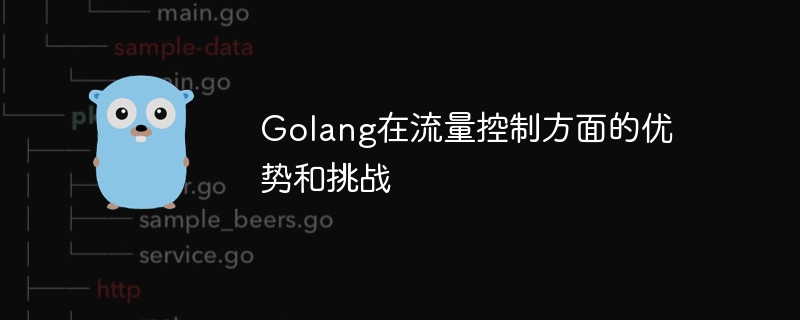Golang's advantages and challenges in traffic control

Golang is a programming language with high development efficiency and superior performance, which performs well when handling high concurrency and large-scale traffic. This article will explore the advantages and challenges of flow control in Golang and provide specific code examples to illustrate its application.
1. Golang’s advantages in flow control
- Concurrency model: Golang uses lightweight thread goroutine to handle concurrency. Each goroutine only occupies a small amount of stack space and can be efficient Start, destroy and schedule locally. This concurrency model makes Golang very suitable for handling large-scale concurrent requests and can easily cope with high-concurrency flow control requirements.
- Channel communication: In Golang, goroutines communicate through Channel. This mechanism is simple and efficient. Using Channel, data transmission and synchronization between different goroutines can be realized, which facilitates control operations such as traffic limiting and speed limiting.
-
Built-in library support: Golang's standard library provides rich concurrency control tools, such as mutexes, semaphores, etc. in the sync package, and the context package is used to pass request-range values and cancel. Signal. These tools can help developers quickly implement flow control functions.

2. Golang’s challenges in flow control
- Concurrency security: in high concurrency In this scenario, ensuring data consistency and security is a challenge. Developers need to pay attention to concurrent access control between goroutines to avoid problems such as data competition and memory leaks.
- Debugging and optimization: Due to the concurrent execution of goroutines, debugging and optimization of flow control may be more complicated. Developers need to master Golang debugging tools, such as pprof and trace, in order to quickly locate and solve performance bottlenecks.
- Algorithm design: When performing flow control, it is necessary to design an appropriate algorithm to implement requested current limiting, rate limiting and other functions. Developers need to deeply understand the principles of flow control, choose appropriate algorithms and implement them in Golang.
3. Code Example
The following is a simple example to show how to implement the rate limiting function based on the Token Bucket algorithm in Golang:
package main
import (
"fmt"
"time"
)
func tokenBucket(rateLimit time.Duration, capacity int) <-chan struct{} {
tokens := make(chan struct{}, capacity)
go func() {
ticker := time.NewTicker(rateLimit / time.Duration(capacity))
defer ticker.Stop()
for range ticker.C {
select {
case tokens <- struct{}{}:
default:
}
}
}()
return tokens
}
func main() {
rateLimit := 1 * time.Second
capacity := 3
tokens := tokenBucket(rateLimit, capacity)
for i := 0; i < 5; i++ {
<-tokens
fmt.Printf("Request %d processed
", i+1)
time.Sleep(500 * time.Millisecond)
}
}The above code A tokenBucket function is defined to simulate the rate limiting function of the Token Bucket algorithm. In the main function, a token bucket with a rate of 1 time/second and a capacity of 3 is created by calling the tokenBucket function. In each loop, the program obtains tokens from the token bucket, simulates the processing of the request, and simulates the request interval through time.Sleep.
The above code example shows how to implement a simple flow control function in Golang, helping developers better understand the advantages and challenges of Golang in flow control.
Summary: Golang has obvious advantages when dealing with large-scale traffic and concurrency, but it also faces some challenges. By making full use of Golang's concurrency model, Channel communication and built-in library support, combined with appropriate algorithm design, developers can efficiently implement flow control functions. In practical applications, it is recommended that developers deeply understand the concurrency characteristics of Golang and flexibly use various tools and technologies to better cope with complex flow control requirements.
The above is the detailed content of Golang's advantages and challenges in traffic control. For more information, please follow other related articles on the PHP Chinese website!

Hot AI Tools

Undresser.AI Undress
AI-powered app for creating realistic nude photos

AI Clothes Remover
Online AI tool for removing clothes from photos.

Undress AI Tool
Undress images for free

Clothoff.io
AI clothes remover

AI Hentai Generator
Generate AI Hentai for free.

Hot Article

Hot Tools

Notepad++7.3.1
Easy-to-use and free code editor

SublimeText3 Chinese version
Chinese version, very easy to use

Zend Studio 13.0.1
Powerful PHP integrated development environment

Dreamweaver CS6
Visual web development tools

SublimeText3 Mac version
God-level code editing software (SublimeText3)

Hot Topics
 1378
1378
 52
52
 What is the problem with Queue thread in Go's crawler Colly?
Apr 02, 2025 pm 02:09 PM
What is the problem with Queue thread in Go's crawler Colly?
Apr 02, 2025 pm 02:09 PM
Queue threading problem in Go crawler Colly explores the problem of using the Colly crawler library in Go language, developers often encounter problems with threads and request queues. �...
 Transforming from front-end to back-end development, is it more promising to learn Java or Golang?
Apr 02, 2025 am 09:12 AM
Transforming from front-end to back-end development, is it more promising to learn Java or Golang?
Apr 02, 2025 am 09:12 AM
Backend learning path: The exploration journey from front-end to back-end As a back-end beginner who transforms from front-end development, you already have the foundation of nodejs,...
 What is sum generally used for in C language?
Apr 03, 2025 pm 02:39 PM
What is sum generally used for in C language?
Apr 03, 2025 pm 02:39 PM
There is no function named "sum" in the C language standard library. "sum" is usually defined by programmers or provided in specific libraries, and its functionality depends on the specific implementation. Common scenarios are summing for arrays, and can also be used in other data structures, such as linked lists. In addition, "sum" is also used in fields such as image processing and statistical analysis. An excellent "sum" function should have good readability, robustness and efficiency.
 Four ways to implement multithreading in C language
Apr 03, 2025 pm 03:00 PM
Four ways to implement multithreading in C language
Apr 03, 2025 pm 03:00 PM
Multithreading in the language can greatly improve program efficiency. There are four main ways to implement multithreading in C language: Create independent processes: Create multiple independently running processes, each process has its own memory space. Pseudo-multithreading: Create multiple execution streams in a process that share the same memory space and execute alternately. Multi-threaded library: Use multi-threaded libraries such as pthreads to create and manage threads, providing rich thread operation functions. Coroutine: A lightweight multi-threaded implementation that divides tasks into small subtasks and executes them in turn.
 Which libraries in Go are developed by large companies or provided by well-known open source projects?
Apr 02, 2025 pm 04:12 PM
Which libraries in Go are developed by large companies or provided by well-known open source projects?
Apr 02, 2025 pm 04:12 PM
Which libraries in Go are developed by large companies or well-known open source projects? When programming in Go, developers often encounter some common needs, ...
 How to solve the problem of Golang generic function type constraints being automatically deleted in VSCode?
Apr 02, 2025 pm 02:15 PM
How to solve the problem of Golang generic function type constraints being automatically deleted in VSCode?
Apr 02, 2025 pm 02:15 PM
Automatic deletion of Golang generic function type constraints in VSCode Users may encounter a strange problem when writing Golang code using VSCode. when...
 How to ensure concurrency is safe and efficient when writing multi-process logs?
Apr 02, 2025 pm 03:51 PM
How to ensure concurrency is safe and efficient when writing multi-process logs?
Apr 02, 2025 pm 03:51 PM
Efficiently handle concurrency security issues in multi-process log writing. Multiple processes write the same log file at the same time. How to ensure concurrency is safe and efficient? This is a...
 distinct function usage distance function c usage tutorial
Apr 03, 2025 pm 10:27 PM
distinct function usage distance function c usage tutorial
Apr 03, 2025 pm 10:27 PM
std::unique removes adjacent duplicate elements in the container and moves them to the end, returning an iterator pointing to the first duplicate element. std::distance calculates the distance between two iterators, that is, the number of elements they point to. These two functions are useful for optimizing code and improving efficiency, but there are also some pitfalls to be paid attention to, such as: std::unique only deals with adjacent duplicate elements. std::distance is less efficient when dealing with non-random access iterators. By mastering these features and best practices, you can fully utilize the power of these two functions.





